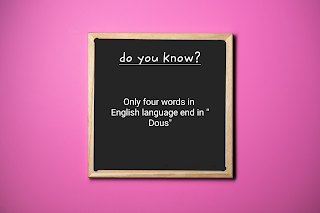do you know , only four words in english language end in "Dous" ?
- Hazardous
- Tremendous
- Stupendous
- Horrendous
- Hazardous
One of the four words that end in "dous" is "hazardous." This word is often used to describe situations or substances that pose a risk or danger. For example, "Working with hazardous materials requires special training and equipment to ensure safety."
- Tremendous
Another word ending in "dous" is "tremendous." This word is quite the opposite of "hazardous" as it's used to convey something extraordinary, immense, or awe-inspiring. For instance, "The response to the charity event was tremendous, with an outpouring of support from the community."
- Stupendous
"Stupendous" is another fascinating word in this rare category. It's used to describe something extremely impressive or astonishing. For example, "The view from the mountaintop was absolutely stupendous, with a panorama that took our breath away."
- Horrendous
The final word in this unique quartet is "horrendous." This word is employed to describe something extremely unpleasant, terrible, or horrifying. For instance, "The accident on the highway was a horrendous tragedy, resulting in multiple casualties."
Why These Words Are Unique
The rarity of words ending in "dous" can be attributed to the complexity and diversity of the English language. English borrows words from various languages, which contributes to its vast vocabulary. Many words that end in "dous" have Latin origins, making them somewhat uncommon but rich in meaning.
Furthermore, the meanings of these words are quite distinct, which highlights the flexibility and precision of the English language. From the positivity of "tremendous" to the negativity of "horrendous," these words cover a wide spectrum of emotions and descriptions.
Conclusion
Only four words in the English language end in "dous," but these words carry significant meaning and play a crucial role in expressing a wide range of emotions and descriptions. Understanding the uniqueness of these words not only enriches our vocabulary but also showcases the depth and diversity of the English language. So, the next time you use "hazardous," "tremendous," "stupendous," or "horrendous" in your writing, you'll have a deeper appreciation for their distinctive qualities.


Comments
Post a Comment